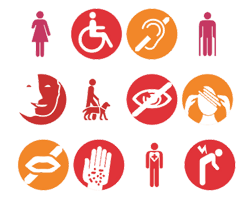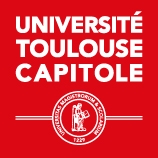General information
- Duration
-
4 semestres
- Available to
-
- Initial course
- Resumption of training
You are here : Home > Course offer > Postgraduate

 Visit the handicap portal
Visit the handicap portal
Semesters 1 and 2 provide students with knowledge and skills in international, private and public law, European Union law, both general and substantive, European law of freedoms and comparative law. Through general or specialised courses on traditional or new topics, teaching covers all areas of legal understanding of the external dimension.
Semesters 3 and 4 provide training in the knowledge and skills needed to understand and manage the internationalisation of legal situations and rules, both in private and public law.
In semesters 3 and 4, the training in French and English, which allows students to move to partner universities, provides lawyers with the reflexes, methods and knowledge they need to deal with internationalisation, Europeanisation and harmonisation of legal situations and rules, whether in private or public law.
Semester 3 provides the general methods and knowledge needed to deal with international situations. In Semester 4, students choose an area of specialisation and complete an internship or prepare a dissertation. Students may also choose to study at a partner university.
The Master programme encourages the development of student life and the organisation of or participation in events (international mooting competitions, etc.) so that, in addition to legal skills, the organisational, communication and exchange skills needed by lawyers working in teams and with partners from all walks of life, whether in law firms, international organisations, companies or universities, are developed.
The opportunity to study at a partner university develops the adaptability and communication skills so necessary in an international context.
MOBILITY WITHIN THE MADIC PROGRAMME:
This type of mobility allows students to spend a semester abroad during the 2nd year of their Master's programme in order to validate the MADIC and obtain a Certificate in Comparative European and International Law (CIEL), awarded by a consortium of European universities. In this mobility programme, courses are mainly focused on international, European and comparative law.
Students who follow the CIEL mobility within MADIC attend the courses and take the exams for the 1st semester of the Master 2 course (September - December) at the University of Toulouse Capitole, according to the procedures described in the examination regulations. During the 2nd semester (January onwards), the student attends classes at one of the partner universities.
During this second period, the student continues their studies at the host university. The examinations are organised according to the procedures of the host university and the grades are then transferred to Toulouse. As part of the CIEL mobility programme, students must validate their MADIC on the research track. Period 3 is therefore validated by the writing of a dissertation directed by a UTC lecturer and supervised by a lecturer from the host university.
All courses at the partner universities are taught in English (except in Barcelona, where students can choose law courses taught in Spanish). Students wishing to study abroad on the CIEL programme must therefore provide a TOEFL IBT (or other internationally recognised English language test) score of at least 90 out of 120 to demonstrate their level of English.
Special rules for mobility with CIEL certification:
School Contact:
MASTER IN LAW AND POLITICAL SCIENCE
2 rue du Doyen Gabriel Marty
31042 Toulouse Cedex 9
YEAR 1 Master
Office: AR 123 (Arsenal building)
Email: pmd01@ut-capitole.fr
Phone: 05 61 63 35 81
YEAR 2 Master
Office: AR 129 (Arsenal building)
Email: pmd10@ut-capitole.fr
Phone: 05 61 63 39 26
Only for questions concerning international mobility:
EUROPEAN SCHOOL OF LAW
Office: AR 334 (Arsenal building)
Email: esl@ut-capitole.fr
ADMISSION TO THE FIRST YEAR OF THE MASTER PROGRAMME:
Admission to the first year of the Master programme is subject to capacity and is based on an assessment of the student's application and, if necessary, an interview for pre-selected students.
To prepare your application for the first year of a Master course, please consult:
- course capacity,
- expectations and general criteria for the examination of applications (recommended degree, prerequisites ....)
- success rate at the end of the Masters programme
- the national Master's platform monmaster.gouv.fr/ for information (admission capacity, expectations and general criteria for examining applications, application procedures, etc.) and applications.
ACCESS TO THE SECOND YEAR OF THE MASTER PROGRAMME:
Right to continue:
Students who have successfully completed the first year (Master 1) of one of the University of Toulouse Capitole's Master programmes are automatically admitted to the second year (Master 2) of at least one of the courses in the same discipline.
You will automatically be able to transfer from the first to the second year of a Master's degree within the same programme, provided that you have completed the application formalities (application on the University's website via the eCandidatures teleservice).
In the case of Master programmes that offer several Master 2 courses within the same discipline, the orientation of the students between the different Master 2 courses takes into account, on the one hand, the plans of each student, the knowledge acquired during their initial training or their skills and, on the other hand, the characteristics of the courses. Enrolment is decided by the President of the University, subject to availability of places, on the advice of a Teaching Committee whose members he/she appoints. Each student is offered admission to at least one of the Master programmes in the field in which they have obtained their Master 1.
Re-orientation:
The enrolment of a student who has validated their Master 1 at the University of Toulouse Capitole and who wishes to continue their studies in another Master programme offered by the institution is subject to verification by the head of the programme in which enrolment is requested that the teaching units already acquired are such as to enable the student to continue their studies with a view to obtaining the Master's degree.
The enrolment of a student who has validated the first year of a Master's degree, in any discipline, at an establishment other than the University of Toulouse Capitole is subject to verification by the head of the programme in which enrolment is requested that the teaching units already acquired at the student's original establishment are such as to enable the student to continue their studies with a view to obtaining the Master's degree.
On the eCandidatures teleservice, students rank in order of preference the Master's programmes to which they wish to apply.
PROGRAMME 2025-2026
UE - Matières obligatoires - 132h CM et 27h TD
Choisir 2 matières renforcées (33h CM + 13,5h TD par matière) :
Droit international privé 1
Contentieux international
Contentieux de l’Union européenne
Choisir 2 matières non renforcées parmi (33h CM par matière) :
Droit international privé 1
Contentieux international
Contentieux de l’Union européenne
Droit international et européen des droits de l’Homme
UE - Matières optionnelles - 30h CM
Choisir 2 options* parmi :
Droit pénal international et européen – 30h CM
Droit fiscal international et européen – 30h CM
Droit privé comparé – 30h CM
Droit public comparé – 30h CM
Droit du commerce international* – 30h CM
Droit international économique – 30h CM
Droit européen des innovations et numérique – 30h CM
UE - Langue vivante - 13h30 TD :
Au choix : Anglais, Allemand, Italien ou Espagnol
*Certaines matières ont susceptibles d’être dispensées en partie en distanciel asynchrone (dispositif hybridation ou dispositif innovation pédagogique)
Choisir 2 matières renforcées à TD parmi (33h CM + 13,5h TD par matière) :
Droit international privé 2
Droit international public
Droit du marché intérieur
Droits fondamentaux de l’Union européenne
Choisir 2 matières non renforcées sans TD parmi (33h CM par matière) :
Droit international privé 2
Droit international public
Droit du marché intérieur
Droits fondamentaux de l’Union européenne
UE - Matières optionnelles - 30h CM
Choisir 2 options* parmi :
Droit pénal international et humanitaire – 30h CM
Droit international et européen des affaires – 30h CM
Droit européen de la concurrence – 30h CM
Droit international et européen des transports – 30h CM
Droit aérien et spatial* – 30h CM
Droit de la nationalité et des étrangers – 30h CM
Droit européen des innovations et numérique – 30h CM
Droit des relations extérieures – 30h CM
UE - Langue vivante - 13h30 TD :
Au choix : Anglais, Allemand, Italien ou Espagnol
*Certaines matières ont susceptibles d’être dispensées en partie en distanciel asynchrone (dispositif hybridation ou dispositif innovation pédagogique)
PÉRIODE 1 – 142h CM
UE 1 : Enseignements fondamentaux 1 – 72h CM - 15 ECTS
Principes généraux des droits européens et internationaux –15h CM - 3.5 ECTS
Théorie général du droit international public – 21h CM - 4 ECTS
Théorie général du droit international privé – 21h CM - 4 ECTS
Droit pénal international – 15h CM - 3.5 ECTS
UE 2 : Enseignements fondamentaux 2 – 87h CM - 15 ECTS
Grands systèmes de droit contemporain – 30h CM - 4.5 ECTS
Droit du vivant - 15h CM - 3.5 ECTS
Private Comparative Contract Law – 15h CM - 3.5 ECTS
Public Comparative Contract Law – 15h CM - 3.5 ECTS
Conférences multidisciplinaires (UE1 et 2) – 12h CM
PÉRIODE 2 – 102h CM
UE : Enseignements de spécialisation - 21 ECTS
- Conférences multidisciplinaires – 12h CM
+ 2 module au choix – 90h CM
Module 1 – Contentieux international – 45h CM - 10.5 ECTS
- Coopération judiciaire internationale – 15h CM - 3.5 ECTS
- International arbitration – 15h CM - 3.5 ECTS
- Contentieux devant les juridictions internationales – 15h CM - 3.5 ECTS
Module 2 – Droit international public approfondi – 45h CM - 10.5 ECTS
- Procédures internationales – 15h CM - 3.5 ECTS
- Droit des télécommunications et de l’internet – 15h CM - 3.5 ECTS
- Droit interne des organisations internationales – 15h CM - 3.5 ECTS
Module 3 – Droit international privé approfondi – 45h CM - 10.5 ECTS
- Droit international privé de l’Union européenne – 15h CM - 3.5 ECTS
- Comparative private international law – 15h CM - 3.5 ECTS
- Protection internationale de la personne – 15h CM - 3.5 ECTS
Module 4 – Droit pénal comparé – 45h CM - 10.5 ECTS
- Grands systèmes de droit pénal contemporain – 15h CM - 3.5 ECTS
- Droit des libertés dans un contexte international – 15h CM - 3.5 ECTS
- International criminal law – 15h CM - 3.5 ECTS
Module 5 – Carrières internationales et européennes – 45h CM - 10.5 ECTS
- Core competences for international careers – 15h CM - 3.5 ECTS
- Statut de la fonction publique internationale et européenne – 15h CM - 3.5 ECTS
- International labour law – 15h CM - 3.5 ECTS
UE Voie professionnelle ou recherche (au choix) - 18h CM - 9 ECTS
* Voie professionnelle : Stage (2 mois minimum) et rédaction d’un rapport de stage. * Voie recherche : Rédaction et soutenance du mémoire de recherche.
Optional internship
- YEAR 1 Master: optional internship
- YEAR 2 Master:
* Professional track: compulsory internship
* Research track: optional internship
In all cases, an internship contract is essential.
Contact the Placement Office:
Tel : 05 61 63 37 35
Email: stages@ut-capitole.fr
Arsenal building, 3rd floor, AR379
The assessment conditions can be downloaded from the download list on the right of this page.


